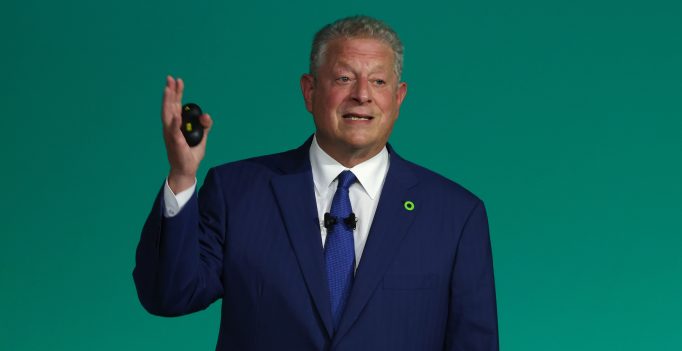NEW YORK CITY—Former Vice President Al Gore paid a visit to the Big Apple earlier this month to help train a new cohort of climate activists just ahead of Earth Day.
The training session, which took place from April 12 to 14, was part of The Climate Reality Project, Gore’s nonprofit that focuses on providing tools and resources to grassroots organizers so they can better tackle issues related to climate change and environmental justice in their own neighborhoods.
Gore, who has become one of the most recognizable climate advocates globally since stepping away from elected politics, also held a private roundtable discussion with a small group of journalists to talk about anything from the upcoming presidential election to the fossil fuel industry’s decades-long misinformation campaign on global warming. Here’s what the former vice president had to say.
This interview has been edited for length and clarity.
On what a second Trump term could mean for climate change:
The technological tailwinds—with the continuing cost reductions for solar and wind electricity, for battery storage, for green hydrogen, for electric vehicles, etc.—will continue to move the sustainability revolution forward regardless of who is president.
But our chance to accelerate that progress to the levels that are necessary to really solve this crisis would be taken away if an anti-climate president came into office. And we saw this in 2017, when a lot of the progress that was already underway did continue, but there were no new initiatives and there was a stagnation when there should have been an acceleration.
On whether climate voters will support Biden:
I think that President Biden has earned their support even though he’s done some things that I disagree with strongly. The specific gravity of the Inflation Reduction Act out-balances almost all of the other issues involved here. What he did there was really historic.
Yesterday, we had the administrator of the Environmental Protection Agency here in New York, talking about a lot of major changes just in the past week—PFAS, forever chemicals, air pollution, etc. There are a lot of examples, and I think the good far, far outweighs the policy changes that I disagree with.
I think at the end of the day, most voters will come to that same conclusion.
“People are beginning to look at their whole cards and they’re being convinced way more by Mother Nature than any of us as advocates at the grassroots level. And I think it is a voting issue, I really do.”
On whether climate change is a top election issue this year:
Some of the polls that indicate it’s not are somewhat misleading. You could also ask, ‘Is the survival of American democracy a defining issue in this campaign or not?’ And the polls will sometimes mislead you into thinking that’s way down the list.
But when people get into the voting booth and they think about the fact that democracy is at risk, we saw in the last elections that actually that did matter.
Climate is the same way. People are beginning to look at their whole cards and they’re being convinced way more by Mother Nature than any of us as advocates at the grassroots level. And I think it is a voting issue, I really do. Particularly among young people.
On the biggest challenges for clean energy development:
The two principal obstacles are: number one, the financing challenges, particularly in the developing world. All 100 percent of projected increases in emissions come from developing countries, and yet, the current system by which private capital is allocated globally shortchanges the developing countries because they have risk factors that are discouraging for lenders and investors. The currency exchange—they don’t know if the value of the currency in Nigeria is going to go up or down and suddenly collapse. Corruption risks, off-take risks, continuity of government risks.
And so traditionally, for really understandable reasons, lenders and investors have been more reluctant to make capital available. I use an example of Nigeria, where interest rates are often seven times higher than the interest rate you have to pay in the U.S. or Europe. If you want to build a new solar farm or whatever, that makes it prohibitive.
Number two, the opposition of the fossil fuel companies. That is a huge, huge obstacle. The U.S. is already distorted by gerrymandering—the distortion of political boundaries of congressional districts—and the nationalization of fundraising. So they have the opportunity to threaten members of Congress, to take away their funding, and instead finance a challenger in the primary.
This has been one of the reasons why one of our two major political parties is now a wholly owned subsidiary of the fossil fuel industry. I mean, it’s pathetic, really, and dangerous.
On how the fossil fuel industry continues to hold up progress on climate action:
One month after they gave the impression that they agreed with the final document in COP28 to transition away from fossil fuels, the American Petroleum Institute began a massive, eight-figure campaign to try to convince the American people that it was unwise and indeed impossible to transition away from fossil fuels. The coal industry began their ‘Not So Fast’ campaign. The CEO of the largest oil and gas company in the world said it’s a fantasy to think we can transition away.
But their public persuasion and advertising campaign is only one part of a multipronged, long-term effort to try to extend their highly disruptive business model into the future as long as they can.
There are the fraudulent claims that carbon capture and direct air capture can be a solution to the crisis that has been created by fossil fuels; the massive use of campaign contributions and lobbying; the skillful use of the revolving door that places fossil fuel beholden executives into positions in charge of public policy, not only in this country but around the world; and the pretense that they will help to lead the energy transition toward renewables when they have utterly no intention of doing any such thing.
This story is funded by readers like you.
Our nonprofit newsroom provides award-winning climate coverage free of charge and advertising. We rely on donations from readers like you to keep going. Please donate now to support our work.
On the importance of permitting reform for the clean energy transition:
The permitting challenge is one that really needs to be addressed. For so long, much of the power wielded in the environmental movement writ large was the power to say no and block things.
National Environmental Policy Act, Clean Air Act, Clean Water Act, the Endangered Species Act: All of these gave environmentalists tools to stop things they didn’t want to go forward. And those tools are available to those who want to stop the siting of a new wind farm or a new solar farm or a new transmission line.
A majority within the environmental movement have now come to the conclusion that we have to crack this nut; we have to find ways to make permitting of new transmission lines, and the rest, easier to accomplish.
And we’ve seen some progress. The approval last month of the Sunrise Wind project off the coast [of New York] is an example of going forward in spite of considerable opposition. I’m not saying it’s solved yet. There is still a legislative remedy, both at local, state and federal levels that needs to be crafted. But slowly we’re making progress on them.









